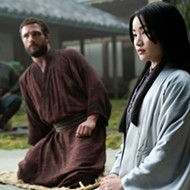SLO Film Fest 23: Reviews for March 16
[{
"name": "Newsletter Promo",
"id": "NewsletterPromo",
"class": "inlineCenter",
"insertPoint": "4",
"component": "15264767",
"requiredCountToDisplay": "0"
},{
"name": "Ad - Medium Rectangle CC01 - 300x250",
"id": "AdMediumRectangleCC01300x250",
"class": "inlineCenter",
"insertPoint": "8",
"component": "2963441",
"requiredCountToDisplay": "12"
},{
"name": "Ad - Medium Rectangle LC01 - 300x250",
"id": "AdMediumRectangleCC01300x250",
"class": "inlineCenter",
"insertPoint": "18",
"component": "2963441",
"requiredCountToDisplay": "22"
},{
"name": "Ad - Medium Rectangle LC09 - 300x250",
"id": "AdMediumRectangleLC09300x250",
"class": "inlineCenter",
"insertPoint": "28",
"component": "3252660",
"requiredCountToDisplay": "32"
}]

AGE OF CONSEQUENCES
What’s it rated? NR
What’s it worth? Streaming
Where’s it showing? March 16 at 10 a.m. at Downtown Centre and 4:30 p.m. at The Palm.
Age of Consequences takes an ambitious and dramatic look at the various ways climate change poses a destabilizing threat to our increasingly interconnected societies and economies.
Produced and filmed from a militaristic angle of national security, the documentary moves through nine themed chapters, taking the viewer around the world from China to the Arctic. The 80-minute journey is alarming, but over-produced (in my opinion) and exhausting. The central message is driven home at the very start: Climate change isn’t just about a warmer earth. Its consequences will affect nearly every facet of life and society, including the availability of natural resources like food and water that will create or exacerbate conflicts across the world as a result.
Current crises you wouldn’t necessarily connect to climate change, like the Syrian civil war; Age of Consequences shows top U.S. military and national security officials and other researchers explaining otherwise. In Syria, for instance, a multi-year drought forced thousands to migrate to urban communities. ISIS then exploited the ensuing destabilization by recruiting members who were desperate to survive.
The film takes us through a variety of past crises, like droughts in Russia, China, and Africa and Hurricanes Katrina and Sandy in the U.S., to demonstrate climate change’s already felt impact. Incentives to address the crisis are, in some ways, lacking, especially in the entrenched fossil fuels economy, which the film argues stands to benefit from the melting arctic where much of the world’s fossil fuel sources remain.
Age of Consequences certainly evidences why climate change is an existential threat and one that ought to be prioritized immediately. But instead of being an inspiring “call to arms,” the documentary is practically crushing in its exhaustive and harrowing presentation. (80 min.)
—Peter Johnson
REFUGEES: ENEMIES OR VICTIMS?
What’s it rated? NR
What’s it worth? Full Price
Where’s it showing? March 16 at 4:15 p.m. and March 17 at 4:30 p.m. at The Palm.
Pick
Nearly 5 million Syrians have fled their home country in the face of destruction from a civil war and the rise of ISIS.
Yet, not even 15,000 Syrian refugees have been allowed into the U.S. by our government. Refugees: Enemies or Victims? is a potent and timely documentary that lays out the Syrian crisis and its horrific reality, charts how the U.S. and the broader international community has responded, and gives the crisis a historical context.
Based in interviews with refugees, activists, faith-based organizations, and scholars, Refugees makes a compelling case that the U.S. is turning its back on refugees in a historic way, during the worst refugee crisis since World War II.
Director, writer, and editor Terence Donnellan does a nice job of unraveling the complexities of the situation and discussing unflinchingly the role that Islamophobia and fear of terrorism in America has played in our cold response.
The film draws extremely interesting parallels to past times of world crisis and o ffers critiques of when the U.S. was particularly welcoming to refugees (Vietnamese during the Vietnam War) and when it was particularly discriminatory and fearful of the supposed dangers (Jewish refugees and Japanese-Americans during World War II).
Refugees also explores the diverse religious makeup of Syria, driving home important points about the relationships between Muslim and Christian Syrians, how people of both religions are victims of the crisis, and how ISIS is a political perversion of Islam that has impacted Muslims as much as any other religious group.
Of course, this documentary takes a compassionate stance toward refugees and a critical stance toward the U.S.’s current policy. But even if you are someone who’s fearful of Syrian refugees, there is a great deal to learn from the film. (50 min.)
—Peter Johnson
THE END OF THE ROAD
What’s it rated? NR
What’s it worth? Matinee
Where’s it showing? March 16 at 4 p.m. at Fremont and March 18 at 4 p.m. at The Palm.
Pick
After the recent election, the threat of moving out of the U.S., packing up and heading to Canada is a little more real.
But for all the jokes about absconding to our friendly neighbor to the north that clogged our Facebook feeds between November and today, really how many would actually do it?
The End of the Road is a documentary about just that. The film tells the tale of the a group of young and idealistic Americans who left their country in the 1960s and ‘70s, and found their way to the tiny rural township of Lund in British Columbia. There, the prototypical “hippies” lived rough off the land, smoked dope, and tried to live authentically and build a community in their new surroundings.
They came from everywhere. New York, Pennsylvania, Texas. Young sons and daughters of the “flower power” generation, many of whom had grown disillusioned with the presidency of Richard Nixon and the ongoing Vietnam War. Many were actively dodging the draft. The story is primarily told through eyes of the current and former residents, and intercut with archival footage from the acid-drenched salad days of Lund. It jumps between these hazy good old days to more recent footage of many of the group getting back together for a reunion celebration.
SLO residents will really get a kick out of this film, which incudes former Lund residents like former SLO Mayor Jan Marx and her husband Steven. Listening to the couple wax philosophic about the hippy-dippy, free-wheeling ideals that brought the young couple to Lund while living in a city that’s banned growing pot, loud music and parties, and smoking pretty much anywhere adds an extra entertaining level of ironic charm to the movie.
In the end, The End of the Road shows in history, both tumult and idealism, fear and hope, a sense of everything falling apart and the hunger of the young to live a different way from their parents, is cyclical. No era, no matter how strange or terrifying, is ever really new, and as we are told in the introduction to the documentary, “This isn’t just something that was. This can be again.”
—Chris McGuinness






